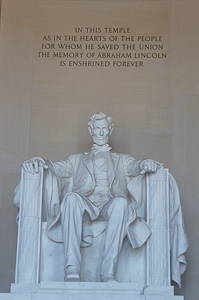Honest Abe, the Rail Splitter, a Native Son of Kentucky, a resident of Indiana, at home in Illinois (Land of Lincoln), the 16th President of the United States, The Great Emancipator: Abraham Lincoln was born on February 12th, 1809. Thus far, nearly 16,000 books have been written about Lincoln, his human development and leadership.
Presidential historian, professor and author, Doris Kerns Goodwin, was advisor on the film, “Lincoln” (2012), directed by Steven Spielberg and based upon a portion of her best selling book, Team of Rivals: The Political Genius of Abraham Lincoln. She believes Lincoln was probably aware in his youth that he possessed genius. He propelled his life toward enormous goals, informed by his consequential gifts and profound hardships through perhaps the most wretchedly adolescent time in American history.Those who study Lincoln with more than superficial interest are infected by this odd person’s profoundly wise, compassionate human spirit. Daniel Day Lewis, method actor extraordinaire who portrayed Abraham Lincoln in the recent motion picture, shared that he came to love Lincoln with regard stronger than he held for anyone he has not met.
Yet, Lincoln was a host of contradictions: liberal and conservative; honest and determined to succeed at practically any cost; ugly awkward and galvanizingly charismatic; gaunt and possessing superhuman strength; lacking formal education and capable of quoting Greek classics; backwoods boy and politically astounding; underestimated, then surprisingly the Republican Party’s Presidential Candidate; intensely serious yet often hilarious; improvisationally brilliant yet characteristically contemplative as a decision-maker; keeper of his own counsel and leader of a Cabinet “team of rivals.”
Historians have pointed out: if we draw a timeline from “Then” through “Now,” and place across this span of time the definitions of important words, we would observe the meanings change at different points in history. Take “leadership.” In Lincoln’s day, leadership was about influencing civilization, informed by core civil values, and the arguments among those in authority were about social principles, duty, and honor. The debate over emancipation was a hot and furious argument about honor and human rights. Lincoln was a leader of that leadership conversation, immensely popular as President in the North, emulated as a true and courageous leader. He was capable of focusing upon the challenges for civilization, not merely to maximize shareholder value.
The word “leadership” in American corporate executive suites during the 1970s and 1980s, was reserved as a term of honor for complimenting the constructive impact a person had. It was largely associated with keen social consciousness, whether the leader’s impact was on one or many. But, in the 1990s, American corporations began using the word “leader” for one who has formal authority. By 2000, the word “leader” began showing up on business cards, and soon anyone with formal authority was referred to as a leader. Today, “honor” is anachronistic, and the word “leadership” has lost its precision.
Some in prominent roles of authority acted with genuine greed. Then, most of us responded as people do, we learned from emulation. Sadly, when human “success” is gauged in terms of accumulated wealth, bad manners and bad actors become the subject of adoring emulation, and leaks spring in our civil ship.
Yet, fortunately a new “leadership” is rising through the dismay, confusion and superficiality, exposing executive greed, beckoning heart and compassion to prevail with authority. Perhaps this is a reaction to how far we had sunk. Maybe it is simply time for the wheel of civilization to eventually turn when threatened, revealing the greater wisdom and human spirit civilization requires.
This Dharmic “leadership” is honorable. It is eventually healing of even those who now protest defensively and struggle to conserve the age of disproportionate opportunity, wealth, privilege and hope.
Abraham Lincoln reminds us of this “leadership” that is reemerging. Today, thanks to research by Great Place to Work® Institute, advances into Conscious Capitalism, experiments of B Corporations, and venturing by social enterprise companies like VisionSpring, profitable examples of how to lead are becoming more visible. Evidently, the silence of suppressed human sprit becomes increasingly insistent on civility and proportionate fairness.
Lincoln’s “leadership” was not about fear, anxiety and divisiveness. Instead, it was big, and socially conscious, heart-filled and fair, courageous and hopeful. This “leadership” is rooted in the core social premise of humans being created equal. It promotes collaborative teamwork and welcomes accountability for core civil values. It is biased toward transparent honesty, human rights and a fair chance for the less privileged. It creates context for greater insight and innovation, and promotes healthy capitalism.
The leadership we see emerging is the fuel and lubricant for Humanity. It is based in the love and honor that reside in each of us. Perhaps one day we will figure out how to maintain the prevalence of such leadership. For now, let’s be grateful for what is happening. Let’s continue to act wisely to ensure brilliant, heart-filled, socially conscious leadership becomes the standard for emulation, long remembered in this or any nation.
What would Lincoln say…?

